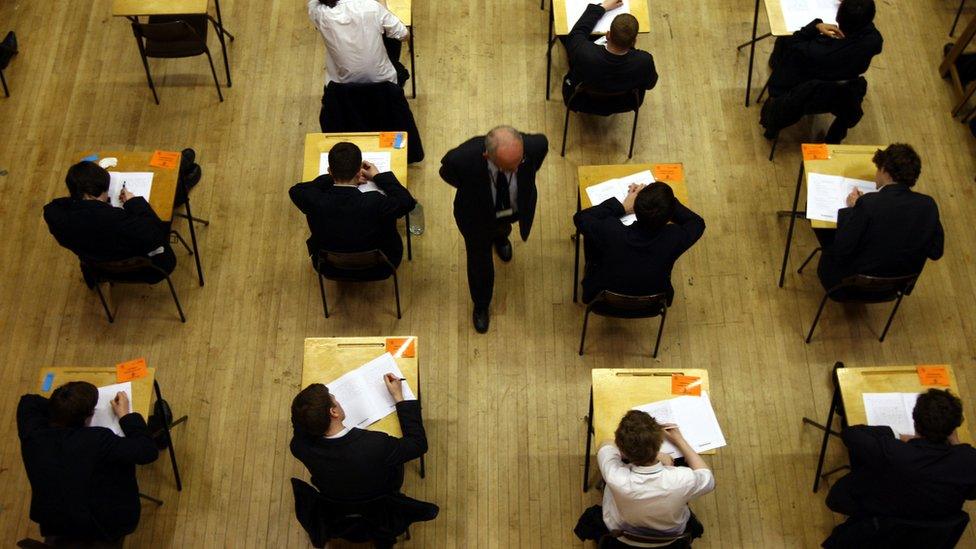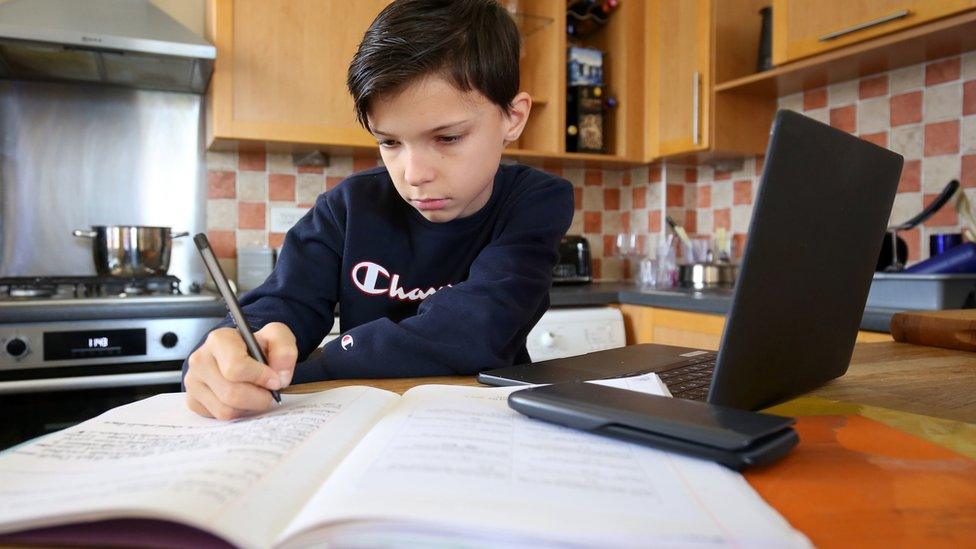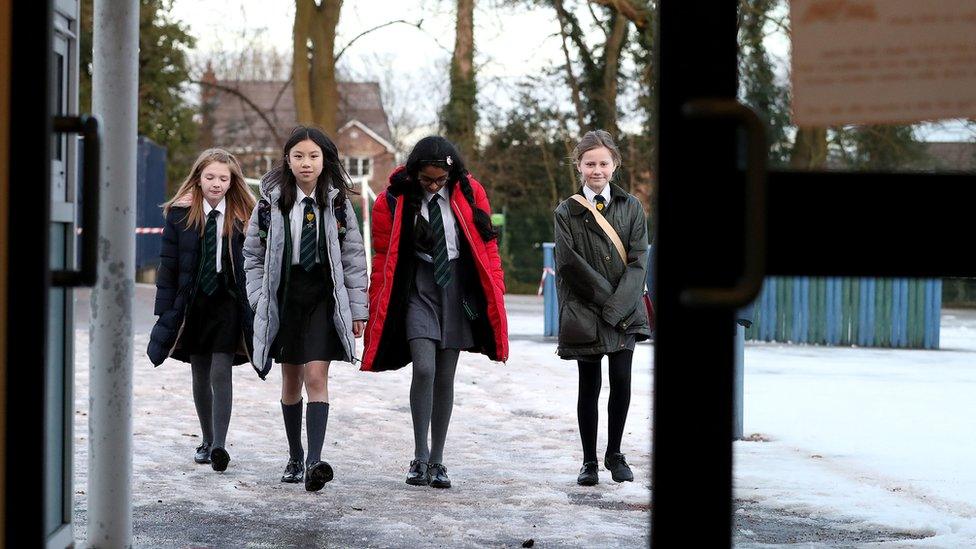England's schools closed with heaviest of hearts - Gove
- Published

Cabinet Office minister Michael Gove said the replacement for exams needed to be "as fair as possible"
The government closed schools in England with "the heaviest of hearts", Cabinet Office minister Michael Gove said, as he confirmed this year's GCSE and A-level exams have been cancelled.
The decision was made after the UK's chief medical officers recommended a move to Covid threat level five.
Mr Gove said teacher-led assessments would have to be used and efforts would be made to ensure grades are fair.
However, there are growing calls for vocational exams to be cancelled.
Many BTecs and technical exams are due to take place in the coming days, but head teachers and college leaders say it would be impossible to hold them and unfair to candidates.
'Unfair'
The mayors of Greater Manchester and Liverpool City Region also called for the exams to be binned.
In a statement, they said: "It is unfair to ask these students to go into colleges when everyone else is being told to stay at home and schools and colleges are closed to the majority of students.
"This will cause unnecessary anxiety and concern just when they need to be able to focus.
"Secondly, students in the Liverpool and Greater Manchester City Regions have faced restrictions for far longer, with more time being spent out of college, than students in other parts of the country, therefore these exams will not be a level playing field."
All primary and secondary schools are closed to pupils, except for vulnerable children and the children of key workers, for the next six weeks. Teaching will continue remotely.
But nurseries and early years settings are being told to remain open. Providers says they are concerned about the risk to staff and the wider community.
One head teacher, Neil Strowger from Bohunt School in Hampshire, said he was "bitterly disappointed and quite upset" for students who have suffered so much disruption this year and "fearful" about what it would mean for them.
Another head teacher Evelyn Ford, of Copthall School in north London, said school leaders had been working hard over Christmas and this week to roll out mass testing and now had to shift their focus to provide lessons remotely for the next six weeks.
And, despite the government saying vocational exams such as BTec should go ahead, with some scheduled for this week, the Association of School and College Leaders said that seemed "pretty impossible".
Michael Gove: "With a heavy heart but with clear evidence we had to act."
On Sunday Boris Johnson said he had "no doubt" that schools were safe, but on Monday he said pupils were transmitting the virus into homes and the community.
Father-of-four, Glen, told the BBC he was angry at having to now juggle home schooling with working from home.
He said: "This wasn't something unforeseen. This wasn't something that came along and hit us out of the blue."
Williamson criticised
Another mother, Camille Barbagallo, said parents "should not have to be in this position".
"We've been hearing of 50,000 cases plus a day, day in day out," she added.
Another father, Emeka, was resigned to the situation, saying: "It's a sacrifice we have to make. We take it on the chin for the country."
Former head of Ofsted, Sir Michael Wilshaw, told BBC Radio 4's World at One programme, he did not think the education department "was being led well at the moment".
"If you talk to head teachers…they lack confidence in the leadership they're receiving," he said, adding that Education Secretary Gavin Williamson should "take final accountability for what's gone on".
'Concerns'
Mr Gove said the Department for Education was working with exams regulator Ofqual, to find a way to assess students that is fair,
Education secretary Gavin Williamson is expected to make a statement on exams in Wednesday, but it is understood that work is ongoing to plan for what will replace them.
Summer exams were cancelled weeks ago on Scotland and Wales, with a range of methods of internal school assessment to be used instead to judge pupils' progress. Some exams are due to go ahead in Northern Ireland.

Analysis: 'The only lever left to pull'
By Hannah Richardson, BBC News education reporter
It was the step the government said it would never take - closing schools again in England to all but a small number of children.
Again and again we were told education was the priority and schools would remain fully open.
The Department for Education stood firm against a crescendo of calls for a circuit-breaker during the October half-term, then against an early holiday in December.
Self-isolating teachers were going to extraordinary lengths to teach remotely from home, while heads created one-way systems, sanitiser stations and installed temperature scanners in school receptions.
But the attendance figures were showing week after week how the virus was impacting on pupils' ability to show up.
For a while, mass testing of pupils seemed to be the answer, but the short time available for head teachers to set this up made it a non-starter.
In the end it was the pressure on the NHS, caused by the new, more contagious variant of coronavirus, which sounded the closing bell for schools.
To shut them was the only lever government had left to pull to try to turn the tanker as a new tide of Covid cases began sweeping the nation.

Geoff Barton, general secretary of the Association of School and College Leaders, said it would be unfair to run the vocational exams.
And the Association of Colleges, which represents further education colleges where many exams are due to be taken, has written to the government calling for vocational and technical exams to be cancelled "without delay".
It also argued there may be difficulties in finding invigilators to actually run the exams.
And nursery providers are questioning how it can be safe to open early years settings, but not schools.
Neil Leitch, chief executive of Early Years Alliance, said: "Many of those working in the early years feel terrified and abandoned by the government. They are being asked to remain on the frontline during the most worrying period of a global pandemic with no PPE, no testing and no access to vaccinations."

TESTING: How do I get a virus test?
SUPPORT BUBBLES: What are they and who can be in yours?
TEST AND TRACE: How does it work?

Anne Longfield, the Children's Commissioner for England, said that remote learning and time out of school had a "very negative impact" for children, and called on the government to ensure consistency in remote learning and access to technology.
She said: "A lot of pupils still don't have laptops. They are surviving on broken phones - those children now need to be seen as a priority to get into the classroom and deemed to be a vulnerable child."
It is understood Ofsted inspectors may be asked to monitor how well schools are providing remote learning.
Technology companies and broadband providers needed to "step up" and address the cost of data for remote learning, which was another obstacle for some families, Ms Longfield said.
- Published5 January 2021

- Published4 January 2021
